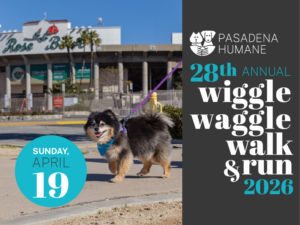HIGHLY PATHOGENIC AVIAN INFLUENZA INFORMATION
Highly Pathogenic Avian Influenza (HPAI) is a highly contagious and potentially fatal type of Avian influenza (bird flu). Bird flu viruses affect both wild and domestic birds. HPAI cases have been reported throughout the country, with cases in wild birds now being reported in Los Angeles County. In collaboration with the California Department of Food and Agriculture, the California Department of Fish and Wildlife and local Public Health Offices, Pasadena Humane is taking a proactive approach to keeping wild and domestic birds safe both at the shelter and in the community.
How is AI transmitted?
AI is most commonly transmitted through the feces of infected birds, particularly waterfowl. Transmission may also occur via bird-to-bird contact, contact with objects or equipment used to care for infected birds, and via wind through feathers, dust and nasal secretions. Transmission from birds to humans is rare and human-to-human transmission is very rare.
What are the symptoms of AI in birds?
Symptoms vary depending on the strain of AI involved. Common symptoms include respiratory discharge or distress (trouble breathing), swollen eyes or head, lack of appetite, lack of energy, weakness, diarrhea, sudden death, or neurological signs such as swimming in circles, tremors, or lack of coordination. Some birds may not show any symptoms at all.
What to do if you find a deceased or sick bird?
The State of California requests that anyone who finds a sick or deceased bird contact a governmental agency before moving or handling the bird.
- Domestic Birds (chicken, duck, goose, pigeon, peacock or dove with bands): Contact the California Department of Food and Agriculture’s hotline at 866.922.2473.
- Wild Birds: Report to the California Department of Fish and Wildlife’s Wildlife Health Laboratory by phone at 916.358.2790 or website at: https://wildlife.ca.gov/Conservation/Laboratories/Wildlife-Health/Monitoring/Mortality-Report.
Additional Tips for Staying Safe:
- If you see a dead bird outside, do not touch it. Notify the appropriate government agency. Once notified, if no special instructions have been given you can use gloves (or a plastic bag turned inside out) to place the deceased bird in a plastic bag for disposal.
- Adopt a “no shoes in the house” policy if you work with or have birds.
- If you have come into contact with wild birds, disinfect your shoes, clothing or other contacted belongings using a 1:10 diluted bleach solution.
- Further information to protect yourself can be found at https://www.cdc.gov/flu/avianflu/avian-flu-summary.htm
If you need assistance with a domestic or wild bird, please click here. If you need help identifying a bird, please text (preferred) or call our wildlife helpline at 626.344.1129.
HOW DO I KEEP MY BIRDS SAFE?
Pet Bird Owners (including pigeons, parrots, finches, etc.)
● House your bird indoors and discontinue all outdoor playtime.
● Remove any outdoor bird baths or feeding stations to avoid any potential contamination. Providing food and water to wild birds encourages birds of different species to come into closer and more prolonged contact with one another than is typical when they feed on natural food items.
● Wash your hands thoroughly before and after handling your birds.
● Change your clothes and wash your hands after handling or coming into contact with other birds or visiting a location that houses poultry, especially if the poultry is kept outside.
● Don’t let your bird come into physical contact with other birds, especially wild birds.
● Know your sources for food and enrichment items. Do not offer food, seeds or tree branches foraged from outside the home.
● Keep cats indoors to prevent them from bringing in the virus from outside.
● Keep dogs on leash while outside and avoid areas where waterfowl or poultry tend to congregate (especially around water), to avoid direct exposure to waterfowl feces.
● Quarantine any new bird coming into the home for at least 14 days. Always handle quarantined birds last and keep all supplies for them separate from your other birds’ supplies.
● If your companion bird is sick, contact your veterinarian immediately.
Poultry owners (Including backyard poultry flocks, duck/geese/quail/pigeon flocks that are outdoors)
In general, backyard flock owners should:
o Not allow visitors into their coop
o Use dedicated clothing and shoes when entering the chicken area
o Keep birds in confined housing with a solid roof and walls
o Minimize contact with wild birds/reduce wild bird attractants to the property by paying attention to spilled food and removing bird baths/outdoor feeding stations
o Monitor their flock regularly for disease
Poultry owners should refer to the USDA website for the latest recommendations on protecting a flock from HPAI. https://www.aphis.usda.gov/aphis/ourfocus/animalhealth/animal-disease-information/avian/defend-the-flock-program/dtf-resources/dtf-resources



